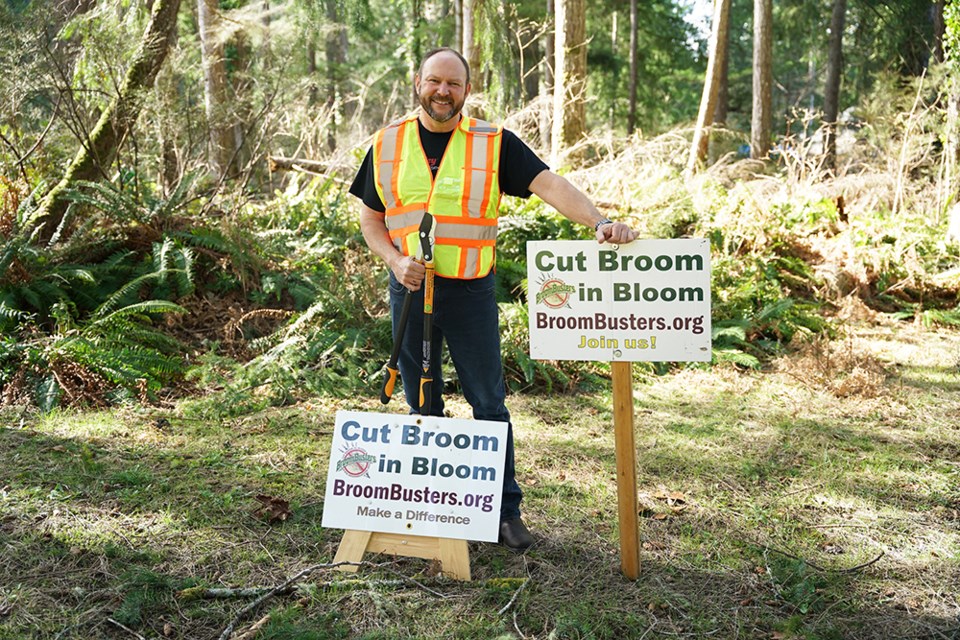Terry Peters, former City of Powell River fire chief and ardent leader of the local Broombusters, has been elected to the board of directors of the Invasive Species Council of British Columbia.
“I’m on a board of 17 directors from all over the province, from all walks of life,” said Peters. “What they were looking for with me was my past career experience as a firefighter for almost 35 years. Also considered was what I do with Broombusters in town, and with the invasive species board involvement here in Powell River.”
Peters said he became involved with the local board because invasive species such as Scotch broom can be flammable, and as a firefighter, he was concerned about the problem. He said there are such huge problems with invasive plant species on Vancouver Island, as well as locally, so he connected with Broombusters to try to hold the line and stop invasives from getting out of control in the qathet region.
The provincial board with which Peters is now sitting is a registered charity and nonprofit society and has an annual operating budget of about $3 million.
“It’s certainly recognized within the province and something I found out is that it is the largest invasive species organization in Canada,” said Peters.
He said he has knowledge of fire prevention and how it relates to invasive species. He said in addition to types of invasive species such as Scotch broom being a fire hazard, what has been noted in the aftermath of wildfires in the province, is that it tends to increase the diversity performance of alien plants.
“Often, invasive species are the first to reappear, post fire,” said Peters. “Working with the FireSmart program here and knowing other fire chiefs around the province, and with connections even outside of Canada, I have a good network to deal with invasive species.”
“I look at what I can do from what I learned in my profession to actually bring awareness to the BC board and dealing with invasive species as it pertains to fires,” said Peters.
The mission of the invasive species council is to help build landscapes in communities that are free of invasive species. This includes education and responsible practices to prevent the spread of invasive species.
“It’s not only plants, but it also includes anything invasive, such as animals,” said Peters. “It’s such an overwhelming problem in the province and it affects everybody. If anyone wants to take a look at what this organization is doing, just go to bcinvasives.ca.”
Peters said his job is to carry the vision of the council, not just in Powell River, but provincially.
“Obviously, I want to use our community as an example because we are on the right track, with Broombusters being an example of that. We also have our Let’s Talk Trash team, which has been active. We have an invasive species drop-off, which is a cooperative effort between City of Powell River and qathet Regional District. Tla’amin Nation is working in that avenue to make for a better community.”
Combative communities
Peters said the regional district purchased a burner to destroy invasive plants and this area is one of the few in the province to have one.
“It really comes down to what you can do to combat invasives within communities,” said Peters. “Invasive species are known to be the second largest contributor to biodiversity, next to land development. So, it’s everybody’s business for us to actually try to deal with it.
“At the end of the day, if we can actually work together to combat the invasive species problems that are within our community, we can address that equally together.”
Peters said he has noted the spread of Scotch broom in the region. He said he was up at the head of Powell Lake and saw some.
“It’s absolutely stunning country,” said Peters. “While we were there, I was shocked to see there’s broom. How did it get there? Well, it’s pretty obvious how it got there. We, as humans, brought it there. It was likely on vehicles.
“Here’s an untouched area that had no invasives. What I’m talking about at the head of Powell Lake is that it will take off if nobody does anything. What’s it going to be like in a few years? It could absolutely decimate the area if nobody does anything.”
Peters is hoping the resource-recovery centre and transfer site being built above Willingdon Beach will be a place where people can get rid of invasive species, rather than dumping them by the power lines which, he said, defies logic.
Join the Peak's email list for the top headlines right in your inbox Monday to Friday.



